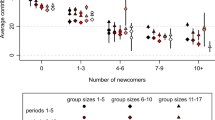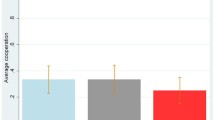Abstract
Coordination problems arise in many economic, political, and social situations. Many times, authorities and institutions are created to solve these coordination problems. However, the success of these institutions depends on whether people are willing to follow their prescriptions. Using a behavioral experiment on Amazon Mechanical Turk we analyze whether an authority can aid in solving hawk-dove coordination games and whether its success depends on a shared identity by the players. The authority is represented in our experiment by a randomizing device that recommends actions to players to implement a socially efficient correlated equilibrium. In the game, players are better off following the recommendations if they believe others will do as well. We investigate whether people are more likely to follow recommendations when they have a shared identity. We find that the device’s success is not driven by group membership, but rather by the content of its recommendations.



Similar content being viewed by others
Data availability
The replication material for this study is available at https://doi.org/10.3886/E193903V2.
Notes
The advent of the global games literature in both economics (e.g., Angeletos et al., 2007; Carlsson & Van Damme, 1993; Morris & Shin, 1998) and political science, (e.g., Aldama et al., 2019; Casper & Tyson, 2014; Malis & Smith, 2019) has been developed partially to come up with unique equilibrium predictions in coordination games.
Importantly, however, some institutions could not only influence players’ beliefs about others’ actions but also their preferences over them.
For a review of the experimental literature on cheap-talk communication see Crawford (1998).
In contrast to our study, Chen and Chen (2011) focus on equilibrium selection, rather than on the implementation of a correlated equilibrium.
It is important to note that in this case, neither payoff dominance nor risk dominance make a prediction of which equilibrium should be selected.
The lowest possible symmetrical payoff, 20, is given by \(a=b=d=\tfrac{1}{3}\), \(c=0\).
In fact, in equilibrium only probabilities that \(p=0\) or \(p=1\) can be sustained.
This was done to ensure the quality of the responses as suggested in Kennedy et al. (2020).
A full set of demographic characteristics divided by treatment condition is available in the Online Appendix.
Screenshots of the instructions are included in the Online Appendix.
For a discussion on how this helps ensure quality, see Hauser et al. (2019).
Equal payoffs are presented in the off-diagonal in an effort to try to make them less immediately salient to participants and have them consider the full payoff table.
Though this was not known by participants ex-ante, given our ex-post matching procedure, in the end, the actions of five participants had to be matched with a player for a second time, though they were only paid for the first match.
In a pilot, we used Smartriqs (Molnar, 2019) to enable people to play at the same time but wait times on MTurk made the ex-post matching a more efficient mechanism.
Of course, the more risk averse participants are, the more likely they would be to choose Dove, even when recommended Hawk, unless they are fairly certain that the other player will choose Dove.
A notable exception being Chen and Chen (2011).
References
Acemoglu, D., & Robinson, J. A. (2001). The colonial origins of comparative development: An empirical investigation. American Economic Review, 91(5), 1369–1401.
Agranov, M., & Schotter, A. (2013). Language and government coordination: An experimental study of communication in the announcement game. Journal of Public Economics, 104, 26–39.
Akerlof, G. A., & Kranton, R. E. (2000). Economics and identity. Quarterly Journal of Economics, 115(3), 715–753.
Aldama, A., Vásquez-Cortés, M., & Young, L. E. (2019). Fear and citizen coordination against dictatorship. Journal of Theoretical Politics, 31(1), 103–125.
Almendares, N., & Landa, D. (2007). Strategic coordination and the law. Law and Philosophy, 26(5), 501–529.
Angeletos, G.-M., Hellwig, C., & Pavan, A. (2007). Dynamic global games of regime change: Learning, multiplicity, and the timing of attacks. Econometrica, 75(3), 711–756.
Arifovic, J., Boitnott, J. F., & Duffy, J. (2019). Learning correlated equilibria: An evolutionary approach. Journal of Economic Behavior & Organization, 157, 171–190.
Aumann, R. J. (1974). Subjectivity and correlation in randomized strategies. Journal of Mathematical Economics, 1(1), 67–96.
Balliet, D., Wu, J., & De Dreu, C. K. (2014). Ingroup favoritism in cooperation: A meta-analysis. Psychological Bulletin, 140(6), 1556–1581.
Bar-Tal, D. (2000). Shared beliefs in a society: Social psychological analysis. Sage Publications.
Bernhard, H., Fehr, E., & Fischbacher, U. (2006). Group affiliation and altruistic norm enforcement. American Economic Review, 96(2), 217–221.
Bicchieri, C. (2006). The grammar of society: The nature and dynamics of social norms. Cambridge University Press.
Billig, M., & Tajfel, H. (1973). Social categorization and similarity in intergroup behaviour. European Journal of Social Psychology, 3(1), 27–52.
Brandts, J., Cooper, D. J., & Fatas, E. (2007). Leadership and overcoming coordination failure with asymmetric costs. Experimental Economics, 10(3), 269–284.
Carlsson, H., & Van Damme, E. (1993). Global games and equilibrium selection. Econometrica, 61(5), 989–1018.
Cartwright, E., & Wooders, M. (2014). Correlated equilibrium, conformity, and stereotyping in social groups. Journal of Public Economic Theory, 16(5), 743–766.
Cason, T. N., & Sharma, T. (2007). Recommended play and correlated equilibria: An experimental study. Economic Theory, 33(1), 11–27.
Casper, B. A., & Tyson, S. A. (2014). Popular protest and elite coordination in a coup d’état. Journal of Politics, 76(2), 548–564.
Charness, G. (2000). Self-serving cheap talk: A test of Aumann’s conjecture. Games and Economic Behavior, 33(2), 177–194.
Chen, R., & Chen, Y. (2011). The potential of social identity for equilibrium selection. American Economic Review, 101(6), 2562–2589.
Chen, Y., & Li, S. X. (2009). Group identity and social preferences. American Economic Review, 99(1), 431–457.
Connor, P., Stancato, D., Yildirim, U., Lee, S., & Chen, S. (2020). Inequality in the minimal group paradigm: How relative wealth and its justification influence ingroup bias. Journal of Experimental Social Psychology, 88, 103967.
Cooper, R., DeJong, D. V., Forsythe, R., & Ross, T. W. (1989). Communication in the battle of the sexes game: Some experimental results. The RAND Journal of Economics, 20(4), 568–587.
Cooper, R., DeJong, D. V., Forsythe, R., & Ross, T. W. (1992). Communication in coordination games. Quarterly Journal of Economics, 107(2), 739–771.
Cooper, R., DeJong, D. V., Forsythe, R., & Ross, T. W. (1993). Forward induction in the battle-of-the-sexes games. American Economic Review, 83(5), 1303–1316.
Cooper, R. W., DeJong, D. V., Forsythe, R., & Ross, T. W. (1990). Selection criteria in coordination games: Some experimental results. American Economic Review, 80(1), 218–233.
Coppock, A., & McClellan, O. A. (2019). Validating the demographic, political, psychological, and experimental results obtained from a new source of online survey respondents. Research & Politics, 6(1), 2053168018822174.
Crawford, V. (1998). A survey of experiments on communication via cheap talk. Journal of Economic Theory, 78(2), 286–298.
d’Adda, G., Dufwenberg, M., Passarelli, F., & Tabellini, G. (2020). Social norms with private values: Theory and experiments. Games and Economic Behavior, 124, 288–304.
Dickson, E. (2010). Leadership, followership, and beliefs about the world: An experiment. New York University Working Paper.
Dickson, E. S., Gordon, S. C., & Huber, G. A. (2015). Institutional sources of legitimate authority: An experimental investigation. American Journal of Political Science, 59(1), 109–127.
Dickson, E. S., & Scheve, K. (2006). Social identity, political speech, and electoral competition. Journal of Theoretical Politics, 18(1), 5–39.
Duell, D., & Valasek, J. (2019). Political polarization and selection in representative democracies. Journal of Economic Behavior & Organization, 168, 132–165.
Duffy, J., & Feltovich, N. (2010). Correlated equilibria, good and bad: An experimental study. International Economic Review, 51(3), 701–721.
Fudenberg, D., & Tirole, J. (1991). Game theory. The MIT Press.
Gintis, H. (2010). Social norms as choreography. Politics, Philosophy & Economics, 9(3), 251–264.
Grossman, G., & Baldassarri, D. (2012). The impact of elections on cooperation: Evidence from a lab-in-the-field experiment in Uganda. American Journal of Political Science, 56(4), 964–985.
Habyarimana, J., Humphreys, M., Posner, D. N., & Weinstein, J. M. (2007). Why does ethnic diversity undermine public goods provision? American Political Science Review, 101(4), 709–725.
Hadfield, G. K., & Weingast, B. R. (2012). What is law? A coordination model of the characteristics of legal order. Journal of Legal Analysis, 4(2), 471–514.
Hara, K., Adams, A., Milland, K., Savage, S., Callison-Burch, C., & Bigham J. P. (2018). A data-driven analysis of workers’ earnings on amazon mechanical turk (pp. 1–14). New York, NY, USA: Association for Computing Machinery.
Hauser, D., Paolacci, G., & Chandler, J. J. (2019). Common concerns with MTurk as a participant pool: Evidence and solutions. In F. R. Kardes, P. M. Herr, & N. Schwarz (Eds.), Handbook of research methods in consumer psychology (pp. 319–337). New York: Routledge.
Kennedy, R., Clifford, S., Burleigh, T., Waggoner, P. D., Jewell, R., & Winter, N. J. (2020). The shape of and solutions to the MTurk quality crisis. Political Science Research and Methods, 8(4), 614–629.
Kranton, R. E., & Sanders, S. G. (2017). Groupy versus non-groupy social preferences: Personality, region, and political party. American Economic Review: Papers & Proceedings, 107(5), 65–69.
Landa, D., & Duell, D. (2015). Social identity and electoral accountability. American Journal of Political Science, 59(3), 671–689.
Malis, M., & Smith, A. (2019). A global game of diplomacy. Journal of Theoretical Politics, 31(4), 480–506.
McAdams, R. H., & Nadler, J. (2005). Testing the focal point theory of legal compliance: The effect of third-party expression in an experimental hawk/dove game. Journal of Empirical Legal Studies, 2(1), 87–123.
Molnar, A. (2019). Smartriqs: A simple method allowing real-time respondent interaction in qualtrics surveys. Journal of Behavioral and Experimental Finance, 22, 161–169.
Moreno, D., & Wooders, J. (1998). An experimental study of communication and coordination in noncooperative games. Games and Economic Behavior, 24(1), 47–76.
Morris, S., & Shin, H. S. (1998). Unique equilibrium in a model of self-fulfilling currency attacks. American Economic Review, 88(3), 587–597.
Morsky, B., & Akçay, E. (2019). Evolution of social norms and correlated equilibria. Proceedings of the National Academy of Sciences, 116(18), 8834–8839.
Morton, R. B., Ou, K., & Qin, X. (2020). Reducing the detrimental effect of identity voting: An experiment on intergroup coordination in china. Journal of Economic Behavior & Organization, 174, 320–331.
North, D. C. (1990). Institutions, institutional change and economic performance. Cambridge University Press.
Olson, M. (1993). Dictatorship, democracy, and development. American Political Science Review, 87(3), 567–576.
Postema, G. J. (1982). Coordination and convention at the foundations of law. Journal of Legal Studies, 11(1), 165–203.
Schelling, T. C. (1960). The strategy of conflict. Harvard University Press.
Shayo, M. (2009). A model of social identity with an application to political economy: Nation, class, and redistribution. American Political Science Review, 103(2), 147–174.
Tanis, M., & Postmes, T. (2005). A social identity approach to trust: Interpersonal perception, group membership and trusting behaviour. European Journal of Social Psychology, 35(3), 413–424.
Wilson, R. K., & Rhodes, C. M. (1997). Leadership and credibility in n-person coordination games. Journal of Conflict Resolution, 41(6), 767–791.
Acknowledgements
For discussions and comments on previous iterations of this project we thank the editor, Dirk Engelmann, two anonymous reviewers, Joel Blaxland, Cristina Bicchieri, Eric Dickson, Eugen Dimant, Jana Freundt, Mateo Vásquez-Cortés and seminar participants at SPSA, NYU New York and NYU Abu Dhabi. We thank the University of Pennsylvania for providing funding.
Author information
Authors and Affiliations
Corresponding author
Additional information
Publisher's Note
Springer Nature remains neutral with regard to jurisdictional claims in published maps and institutional affiliations.
Supplementary Information
Below is the link to the electronic supplementary material.
Rights and permissions
Springer Nature or its licensor (e.g. a society or other partner) holds exclusive rights to this article under a publishing agreement with the author(s) or other rightsholder(s); author self-archiving of the accepted manuscript version of this article is solely governed by the terms of such publishing agreement and applicable law.
About this article
Cite this article
Aldama, A., Draganoff, D. & Pahwa, G. An experiment in the role of identity in fostering coordination. J Econ Sci Assoc (2024). https://doi.org/10.1007/s40881-023-00158-y
Received:
Revised:
Accepted:
Published:
DOI: https://doi.org/10.1007/s40881-023-00158-y




